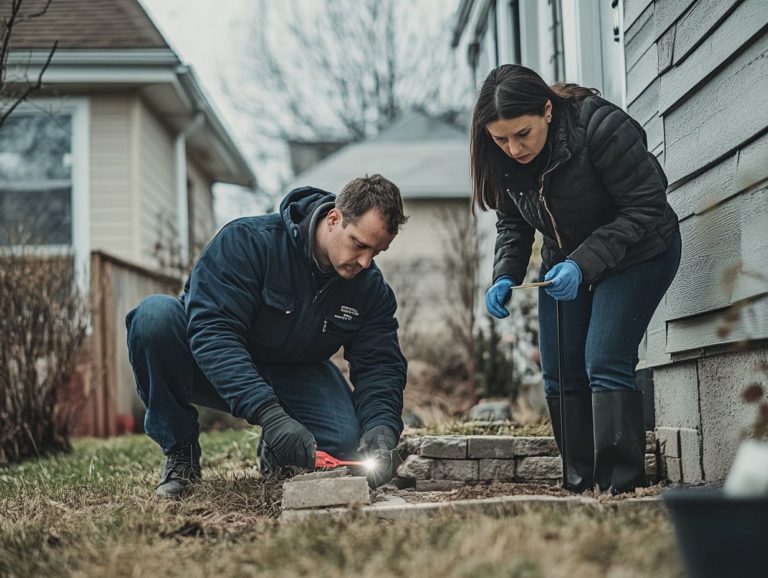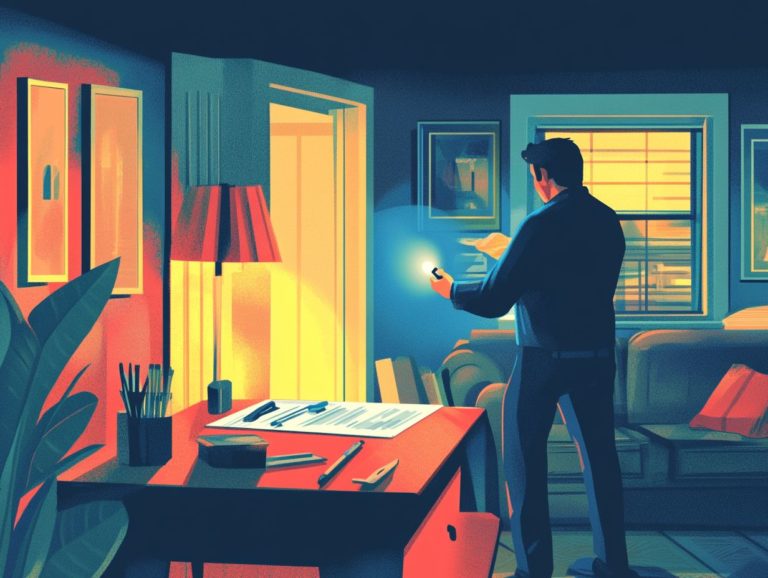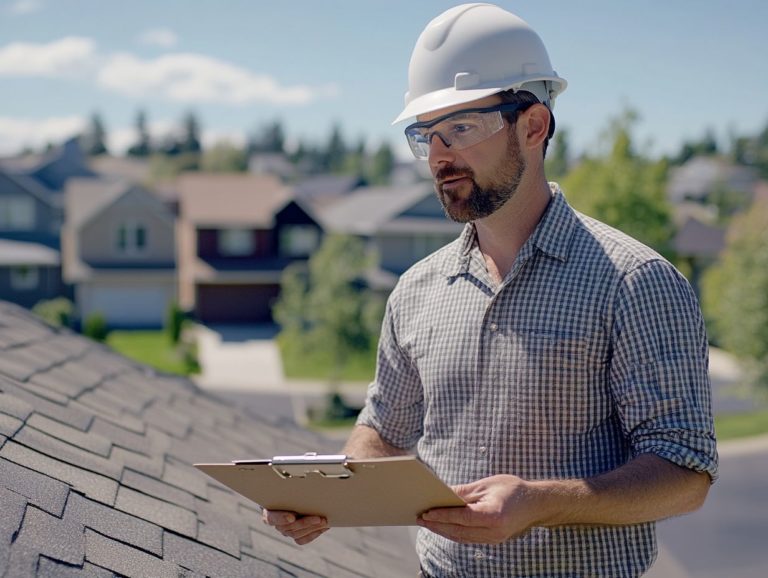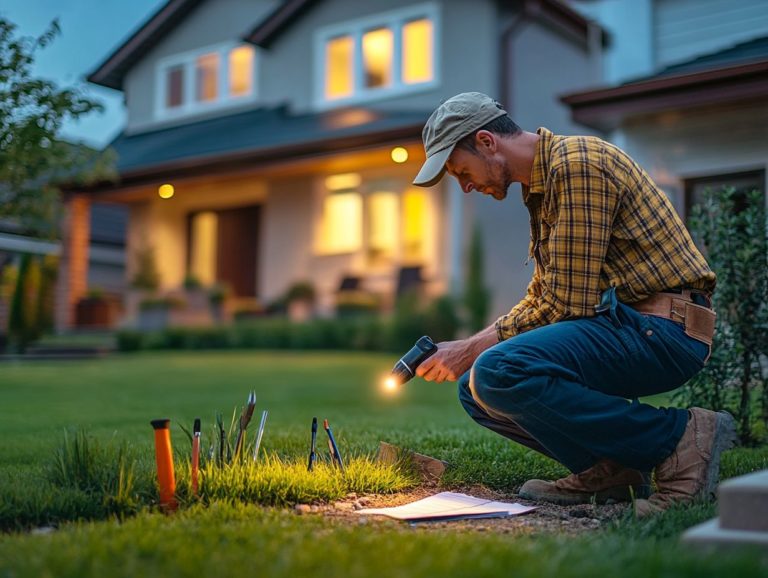The Importance of Home Inspections for New Homeowners
Buying a home is one of the most significant investments you ll ever make. Ensuring it s in top condition is absolutely essential.
A home inspection offers a detailed look at a property s condition. It reveals potential issues before you finalize the purchase.
This article delves into what a home inspection entails, why it s crucial for new homeowners, and the common problems that inspectors frequently uncover.
You ll also learn how to prepare for the inspection, what to expect during the process, and how to interpret the findings. This will help guarantee your new home remains a safe haven for years to come.
Whether you re a first-time buyer or a seasoned homeowner, understanding the details of home inspections can empower you to make informed decisions and effectively maintain your property.
Contents
- Key Takeaways:
- What is a Home Inspection?
- Why Home Inspections are Important for New Homeowners
- Common Issues Found in Home Inspections
- How to Prepare for a Home Inspection
- What to Expect During a Home Inspection
- Interpreting the Inspection Report
- Maintaining Your Home After the Inspection
- Frequently Asked Questions
Key Takeaways:

A home inspection is a thorough examination of a property’s condition and is essential for new homeowners. It can uncover hidden issues and save homeowners from unexpected and costly repairs. Understanding the findings of a home inspection is crucial, as it highlights the importance of home inspections for property buyers, helping new homeowners properly maintain their property and protect their investment.
What is a Home Inspection?
A home inspection is an essential step in your home-buying journey. Understanding the importance of home inspections in real estate can help ensure that a qualified inspector conducts a comprehensive evaluation of the property.
This meticulous process uncovers potential issues that could impact both the value and safety of your future home.
By investing in a thorough inspection, you gain valuable peace of mind. It ensures you re fully informed about any hidden problems that might lead to expensive repairs down the line.
Definition and Purpose
The purpose of a home inspection is to provide you with a thorough evaluation of a property’s condition. It highlights any safety risks and structural issues that may be lurking beneath the surface.
During this comprehensive assessment, various aspects of the property are examined, including plumbing, electrical systems, the roof, and the foundation.
Each element is meticulously scrutinized to uncover potential defects that could escalate into more significant problems.
For you as a homebuyer, understanding these elements can greatly influence your decision-making process.
Identifying safety hazards, such as faulty wiring or mold concerns, protects your investment and ensures the well-being of future occupants.
Therefore, a home inspection is a pivotal step for anyone looking to make a safe and informed purchase, highlighting the importance of a thorough home inspection.
Why Home Inspections are Important for New Homeowners
Home inspections are essential for safeguarding you from buyer’s remorse, as they reveal hidden issues that could result in expensive repairs and safety concerns. Understanding the importance of home inspections can help you make informed decisions during the buying process.
This process facilitates securing home insurance and enhances your negotiating power in the real estate market. It ensures you are well-informed about your investment.
Benefits of a Thorough Inspection
A thorough home inspection offers a wealth of advantages. You have the chance to negotiate a better deal based on the findings.
It also provides the opportunity to secure a home warranty for added protection against future expenses.
This assessment reveals potential issues that could impact the property’s value and arms you with the knowledge needed for constructive discussions with sellers.
With detailed reports in hand, you can make informed decisions that might lead to substantial savings. Ensure that necessary repairs are addressed before finalizing the deal.
The peace of mind that comes from having a home warranty means that should anything unexpected occur after your purchase, you won t be left scrambling to cover financial surprises.
Ultimately, a meticulous inspection enhances the appraisal process and cultivates a sense of security in your investment.
Common Issues Found in Home Inspections
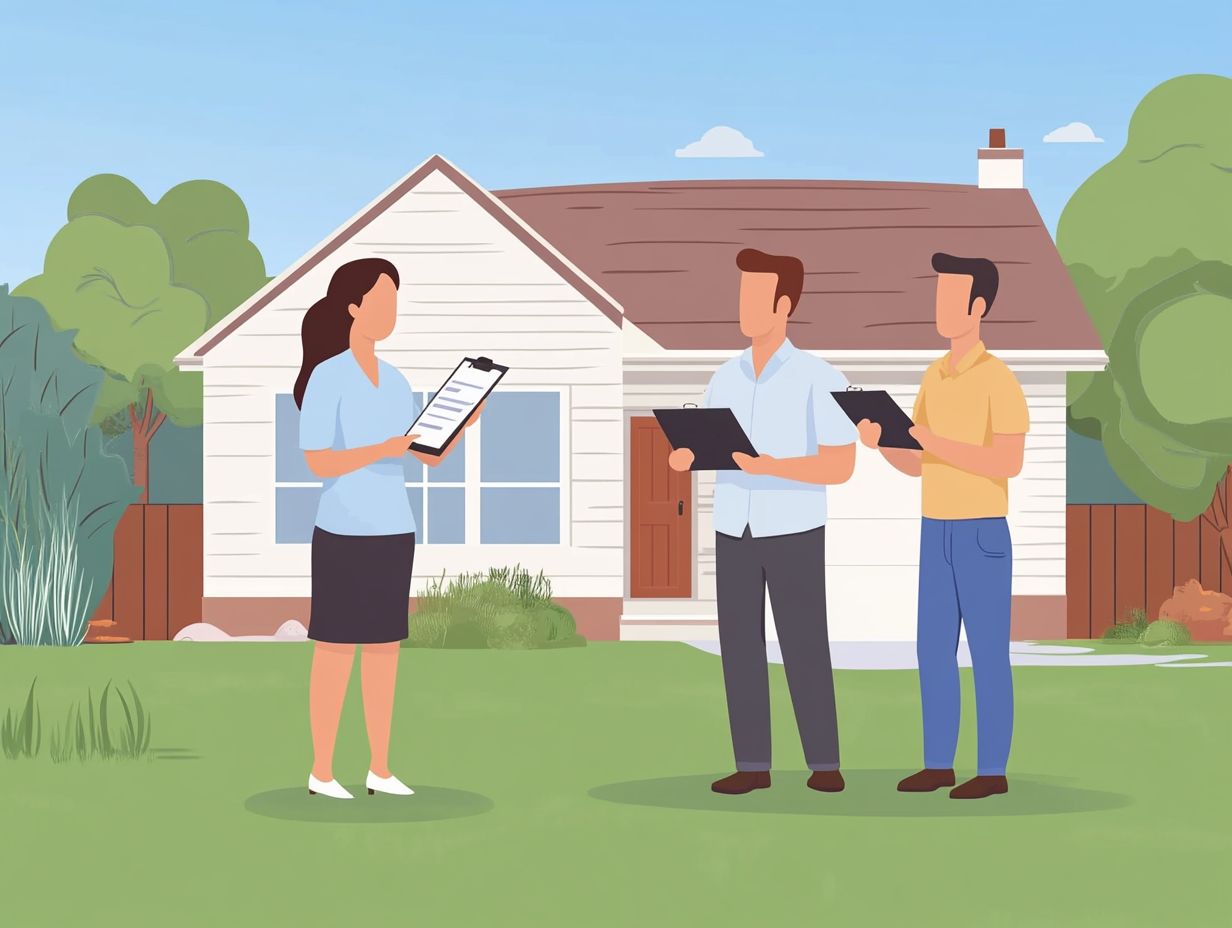
Home inspections often uncover a range of issues that can impact both the value and safety of a property. From structural concerns and HVAC system malfunctions to water quality issues, pest infestations, and deficiencies in the electrical system, the findings can be quite revealing.
Recognizing these potential risks early on is crucial for you as a prospective homebuyer. It ensures you make informed decisions about your investment.
Don t wait to schedule your home inspection. Act quickly to address any issues that may arise!
Structural, Electrical, and Plumbing Concerns
During home inspections, you might find serious issues like problems with the structure, electrical failures, and plumbing leaks. These can pose safety risks and lead to costly repairs if not fixed right away.
These issues can weaken the property and create expensive repair bills. Inspectors carefully check the foundation and other key parts of your home for any signs of damage.
They also inspect the electrical systems for old wiring or faulty parts that could start fires. Plumbing, often hidden behind walls, is checked for leaks and rust, which can cause severe water damage and mold.
Act quickly to keep your home safe and sound! By addressing these issues, you not only improve safety but also protect your home s value.
How to Prepare for a Home Inspection
Preparing for a home inspection means taking steps to ensure your property is in good shape for evaluation.
Start by understanding the inspection process and fixing any visible issues early. This helps make the inspection go smoothly and shows your home at its best.
Steps to Take Before the Inspection
Before the inspection, use a checklist to ensure every part of your property is accessible. Fix minor issues that might catch the inspector’s eye.
Clear pathways to attics, basements, and crawl spaces so inspectors can access them easily. Ensure all utilities are working, as this can positively impact the inspection results.
Consider small repairs, like fixing leaky faucets or broken tiles. A thorough cleaning, inside and out, helps highlight your home s best features.
By following these tips, you can make the inspection process smoother and potentially increase your property s value, making it more attractive to buyers.
What to Expect During a Home Inspection
During a home inspection, a skilled inspector will carefully evaluate your property. They will look at the structure and any potential hazards.
Throughout the process, the inspector will explain their findings and clarify any associated costs, keeping you informed.
Process and Timeline
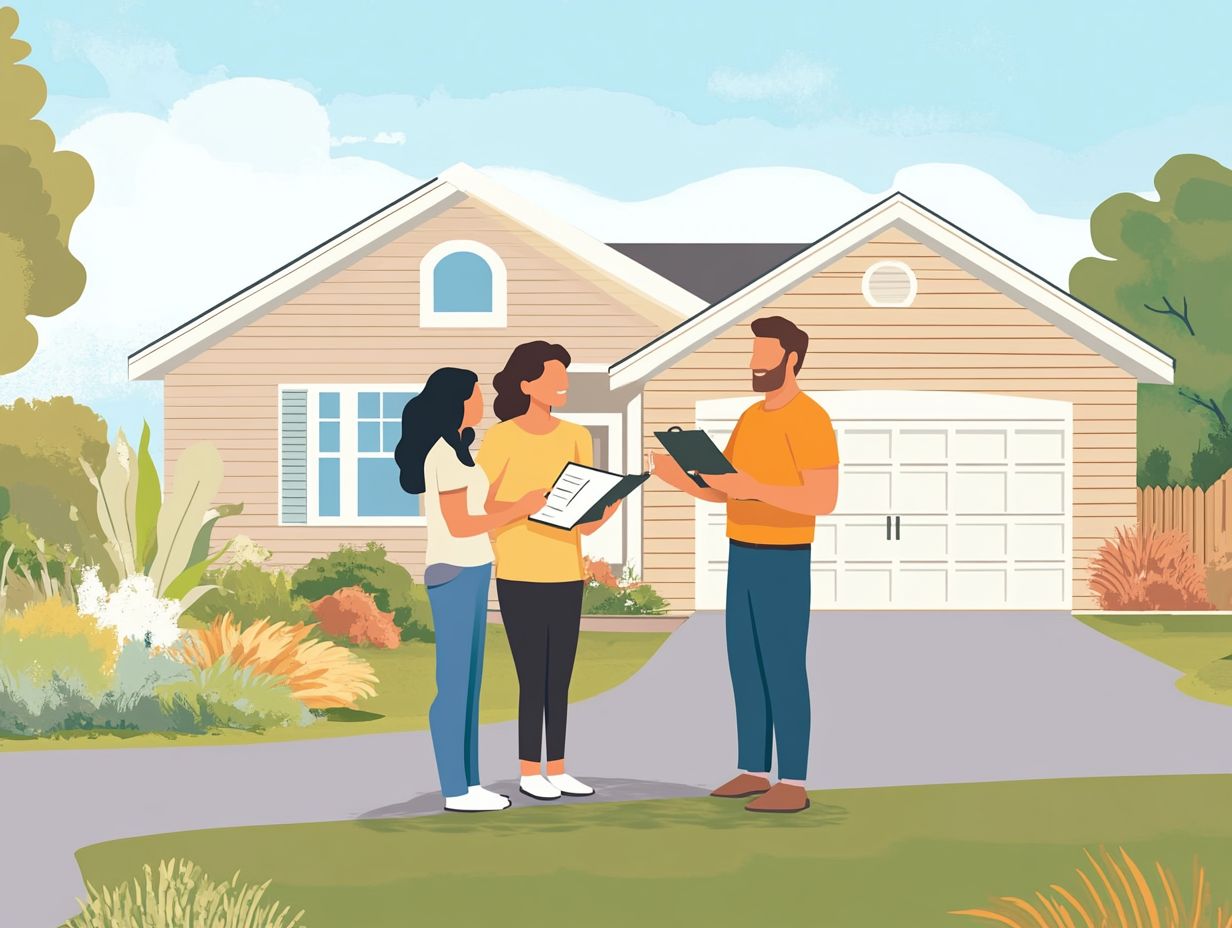
The home inspection process follows a clear timeline: schedule the appointment, have an on-site evaluation, then receive a detailed inspection report.
Knowing this timeline is crucial if you’re serious about buying a property.
- Scheduling the inspection can vary based on availability; ideally, book it soon after making your offer.
- During the evaluation, the inspector examines both the inside and outside of the home for any safety or value issues.
- Once finished, you ll receive a detailed report with findings and recommendations.
By understanding this process, you can make informed decisions, negotiate repairs, and avoid unexpected costs, leading to a smoother path to homeownership.
Interpreting the Inspection Report
Interpreting the inspection report is crucial for homebuyers. This report summarizes the property’s condition and outlines the next steps for any issues found.
Understanding this document helps you make smart choices about your investment.
Understanding the Findings and Next Steps
Understanding the inspection report is crucial for you as a homebuyer. It highlights necessary repairs and provides valuable leverage during negotiations with the seller.
By carefully examining the specific issues outlined in the report, you can categorize repairs into urgent matters and those that can wait. This distinction helps you prioritize immediate safety concerns while gaining insight into potential long-term expenses.
For instance, if the report reveals aging plumbing or a compromised roof, you can use this information to discuss concessions or request repairs from the seller before finalizing your purchase. This strategic approach ensures you’re making an informed decision while keeping an eye on future costs that could arise if these issues are overlooked.
Maintaining Your Home After the Inspection
Maintaining your home after the inspection is essential for preserving its condition. It can prevent expensive repairs down the line and underscores the importance of thorough home inspections and a clear understanding of your responsibilities as a homeowner.
Prioritizing upkeep enhances the longevity of your property and safeguards your investment for years to come.
Tips for Regular Maintenance and Repairs
Regular maintenance and timely repairs are essential for homeowners. They help manage maintenance costs and ensure the longevity of your property. Staying proactive about upkeep allows you to avoid larger issues like water damage from leaky roofs or extensive electrical problems.
It s crucial to routinely inspect key areas like plumbing, heating, ventilation, and air conditioning systems, and the exterior of your home. Checking for signs of wear or damage enhances safety and helps maintain your property value.
Simple tasks like cleaning gutters, replacing air filters, and inspecting sealants can significantly reduce the likelihood of costly repairs. These tasks are vital components of an effective property evaluation strategy.
Frequently Asked Questions

What is the importance of home inspections for new homeowners?
Home inspections are crucial for new homeowners. They provide a thorough evaluation of the property’s condition, identifying potential issues or maintenance needs. Understanding the importance of home inspections for new homeowners helps buyers make informed decisions and avoid unexpected expenses in the future.
When should I schedule a home inspection?
Schedule a home inspection as soon as your offer is accepted. This gives you enough time to negotiate any necessary repairs with the seller or back out of the deal if the inspection reveals major issues.
What exactly do home inspectors look for?
Home inspectors thoroughly examine the property’s structural components, major systems, and safety features. This includes the foundation, roof, electrical systems, plumbing, and more. They also check for potential safety hazards, such as mold or radon.
Do I need to be present during the home inspection?
You should be present during the home inspection. This allows you to ask questions, see potential issues firsthand, and understand the inspector’s findings in more detail.
What if the home inspection reveals major issues?
If the home inspection reveals major issues, consider your options. You can negotiate with the seller to have them make necessary repairs before closing, ask for a price reduction to cover repair costs, or back out of the deal altogether.
Can I waive the home inspection to save money?
Waiving the home inspection may be tempting, but it is not recommended. A home inspection can save you thousands of dollars in unexpected repairs. It is a small price to pay for peace of mind and a thorough evaluation of the property.
Start your home inspection today to secure your investment!

